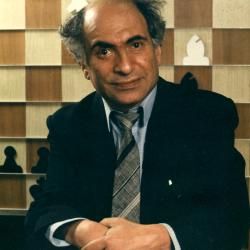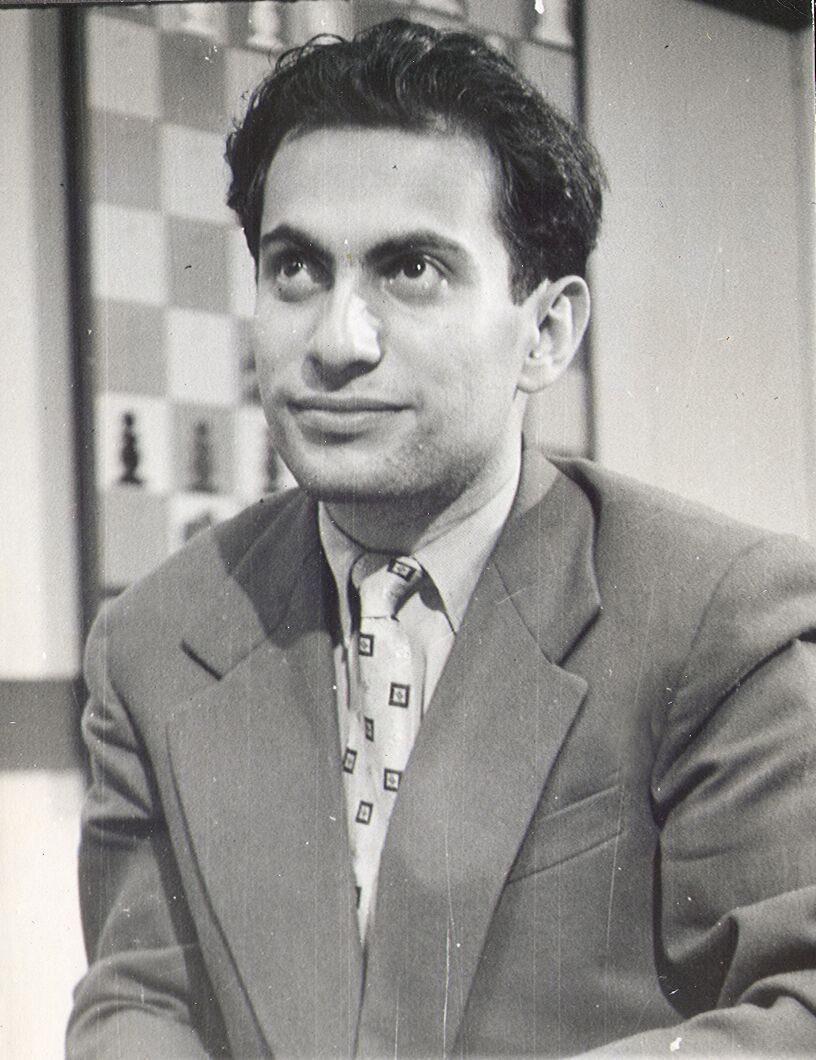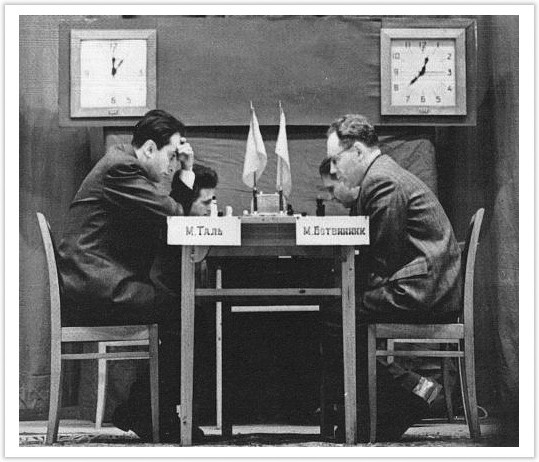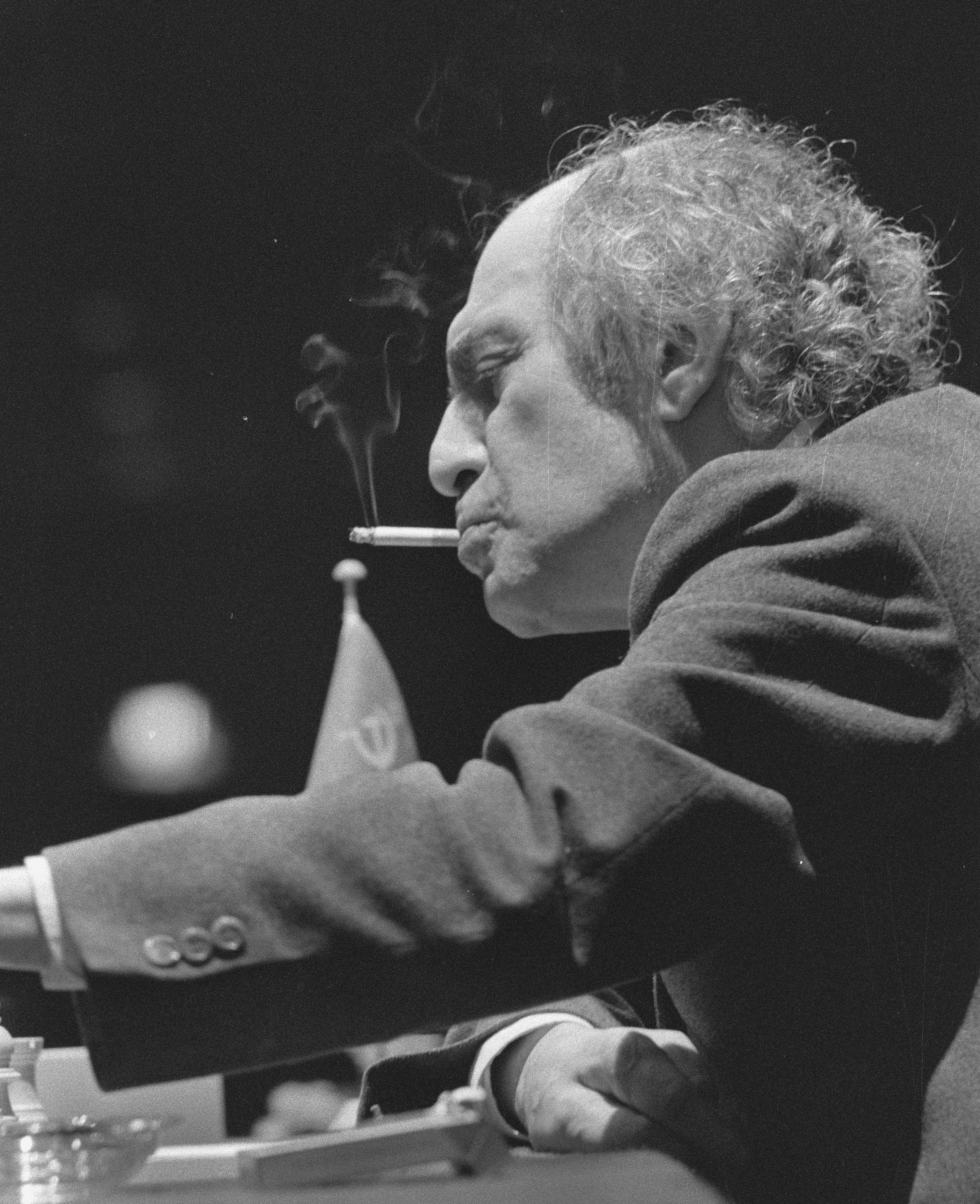GM Mikhail Tal

Bio
Mikhail Tal was born in Riga, Latvia in 1936. He would come to be known as the “Magician from Riga” for his unique tactical style. It was an approach that would win him several fantastic games, not to mention the championship of the world in 1960.
Longtime poor health, due in large part to a lifestyle full of drinking and smoking, would sadly cost Tal his life in Moscow in 1992 at just 55 years old. But it was not before he left an indelible mark on chess, not only in his success at the board but also through his personality and writings. His 1975 autobiography, The Life and Games of Mikhail Tal, is considered a classic. (All Tal quotes below are from the 1997 “Everyman Chess” edition of The Life and Games of Mikhail Tal.)
- Pre-Championship Career
- 1960 World Championship
- 1961 World Championship
- Post-Championship Career: 1960s
- Post-Championship Career: 1970s
- Post-Championship Career: 1980s and 90s
- Legacy
Pre-Championship Career
Tal began his autobiography by comparing the first chess game of one’s life to a case of the flu before symptoms start to show. A strange metaphor, one which perhaps only Tal was capable of. He meant that after playing (and losing) one’s first game, nothing seems to be different in life, but that after a few victories, “you involuntarily begin to sense that, without chess, there is something missing in your life” and now “you belong to that group of people without a natural immunity to the chess disease.”
Tal recalled that “during the six years that my age allowed me to take part in youth events, I progressed from the last to the first board in our team.” Such rapid progress in the Latvian chess scene continued after Tal aged out of youth events and culminated with his first Latvian Championship in 1953, achieved with a +12 -2 =5 score
With a +9 -2 =10 score, Tal won the first of an eventual six Soviet Championships in 1957, ahead of a 22-player field that included Paul Keres, David Bronstein, Boris Spassky, Viktor Korchnoi, and Tigran Petrosian, then followed it up with his second the very next year. But that latter victory was not his most important tournament of 1958.

In 1958 Tal also won the Interzonal tournament in Yugoslavia, where the top six finishers qualified for the Candidates tournament in 1959, also held in Yugoslavia. Tal cleared the Candidates field by 1 ½ points with a +16 -4 =8 score, including a perfect 4/4 against 16-year-old future world champion Bobby Fischer. Now he was ready to face Mikhail Botvinnik for the ultimate championship.
1960 World Championship
Tal won the first game in a convincing 32 moves against Botvinnik’s favored French Defense. Tal later recalled that he and his trainer, Alexander Koblents, guessed correctly that Botvinnik would play the Winawer French. Despite an innovation from Botvinnik, Tal considered himself “well familiar with the character of the position,” and it showed.
Tal would draw the next four games before winning the next two, including with a memorable knight sacrifice on move 21 in Game 6. Tal himself called the move “good, in that all other continuations are bad.”
Botvinnik immediately responded with two wins of his own to keep Tal from running away with a victory. Nevertheless, Tal would not lose another game in the match, winning the 11th, 17th, and 19th contests. In the 17th game, Tal played what he would later call his most memorable move of the match, 12. f4. Tal admitted its obvious drawbacks but thought it would throw Botvinnik off and that it could only really be exploited by opening the game for Tal’s bishops.
After winning Game 19, the title was Tal’s to lose, and two draws in Games 20 and 21 clinched the title. Tal was the youngest world champion to date, a record that would be broken by Garry Kasparov in 1985.

1961 World Championship
Botvinnik automatically earned a return match by the rules of the time. The Botvinnik-Tal rematch was a bloodbath, with just six draws in 21 games. (Compare this to the 2018 Carlsen-Caruana match!) Tal won the eighth game to narrow the gap to 4 ½ - 3 ½, but Botvinnik won the next three games to take a commanding lead. Each side won three times in the next nine games before Botvinnik regained his title with a victory in Game 21.
Even though Tal (24) was still less than half Botvinnik’s age (50) during the 1961 match, it was the Latvian whose health was an issue, with his kidneys already in bad shape. But Tal made no excuses, attributing his defeat to a change in Botvinnik’s approach which Tal did not anticipate.
Post-Championship Career: 1960s
Tal never again qualified for the world championship match -- he had to withdraw from his next chance to do so, the 1962 Candidates tournament, due to health -- but remained a dominant force in world chess throughout the 1960s. This was especially true in 1964, when Tal won international tournaments in Hastings, Reykjavik, and Kislovodsk.
Additionally, he tied for first in the Amsterdam Interzonal in 1964, thus qualifying for the Candidates matches to determine a challenger for new champion Tigran Petrosian. Tal defeated Lajos Portisch 5 ½ - 2 ½ and Bent Larsen 5 ½ - 4 ½ in the first two rounds and was one more match victory from the right to play Petrosian.
Unfortunately, a +1 -4 =6 loss to Boris Spassky in the Candidates final ended that possibility. Tal lost the last three games, saying in his autobiography that he got “carried away” in Game 9, “played unevenly, and badly” in Game 10, and that Spassky played his best game of the match in Game 11. Petrosian would end up retaining his title vs. Spassky in 1966.
By making it to the Candidates finals in 1966, Tal automatically qualified for match play in 1969 (rather than needing to place in the Interzonal tournament). He defeated Svetozar Gligorić in the quarterfinal but fell to Viktor Korchnoi +1 -2 =7 in the semifinal. Entering the tenth and decisive game, Tal needed a win to force a playoff.
He would later state he “began the...game very calmly” because “a loss and a draw were equally worthless to me,” and so “there could be no question of any unjustified risk.” Around move 30, however, “nerves came into the act” at the thought of the psychological advantage Tal thought he would enjoy in a playoff. Tal made a pawn sacrifice he would later criticize, 32...g5, one of the few in his career that did not work. The game was ultimately drawn and Tal was eliminated. Korchnoi in turn fell to Spassky, who this time defeated Petrosian for the championship.
Tal earned his third Soviet Championship, shared with Lev Polugaevsky, in 1967.
Post-Championship Career: 1970s
Tal won his last three Soviet Championships in the 1970s. He did so outright in 1972, and shared the last two with Alexander Beliavsky in 1974 and Vitaly Tseshkovsky in 1978.
Tal did not participate in the 1972 championship cycle that ultimately crowned Bobby Fischer as champion, nor the 1975 cycle that Anatoly Karpov emerged from. In the 1976 Biel Interzonal for the 1978 championship, Tal finished fourth, but only the top three advanced.
Nonetheless, the 1970s were also a prolific time for Tal. In addition to the two Soviet championships, from 1972-74 he had two long undefeated streaks of 86 and 95 games. The latter stood as a record until Ding Liren snapped it in 2018.
Post-Championship Career: 1980s and 90s
Near-misses would continue to characterize Tal’s attempts to qualify for the 1984, 1987, and 1990 championships. He finished third in the 1982 Moscow Interzonal, behind Kasparov and Beliavsky, but only the top two qualified for the Candidates tournament. A third place finish in the 1985 Taxco Interzonal was, however, enough to qualify for the Candidates, but Tal finished fifth in the round-robin phase, and only the top four got to play a short series of knockout matches. And in Tal’s final world championship cycle, he would just miss qualifying for the Candidates tournament after a fourth place finish at the 1987 Subotica Interzonal, where only the top three advanced.
But even as Tal’s career wound down, he was fully capable of magic, as in this famous game against Iceland’s Johann Hjartarson in 1987.
Tal's last notable tournament victory came in the World Blitz Championship held in 1988, before such an event became a regular fixture of the chess scene. It was a 32-player knockout tournament in which Tal emerged victorious. He did not face Karpov, who lost in the second round, or Kasparov, who fell in the quarterfinals. Tal instead beat Artur Jussupow 3-0 in the quarterfinal, Alexander Chernin 2 ½ - 1 ½ in the semis, and Rafael Vaganian 3 ½ - ½ in the finals.

Legacy
Tal played chess right up until near the end of his life, participating in a blitz tournament just a month before his death. When he passed on June 28, 1992, American GM Robert Byrne told the New York Times, “It sounds trite, but few love the game as much as he did. You could just see it. Some players consider it labor. This man loved chess.”
Contests like Game 6 against Botvinnik in 1960, or the sacrifice against Hjartarson in 1987, are examples of how Tal’s exploits at the board will be remembered. In the 2004 version of The Mammoth Book of the World’s Greatest Chess Games, no player had more games selected than Tal.
He was world champion for “only” a year, but was a great player for much longer than that. A marvelous player with a larger-than-life personality, Tal will surely never be forgotten.


